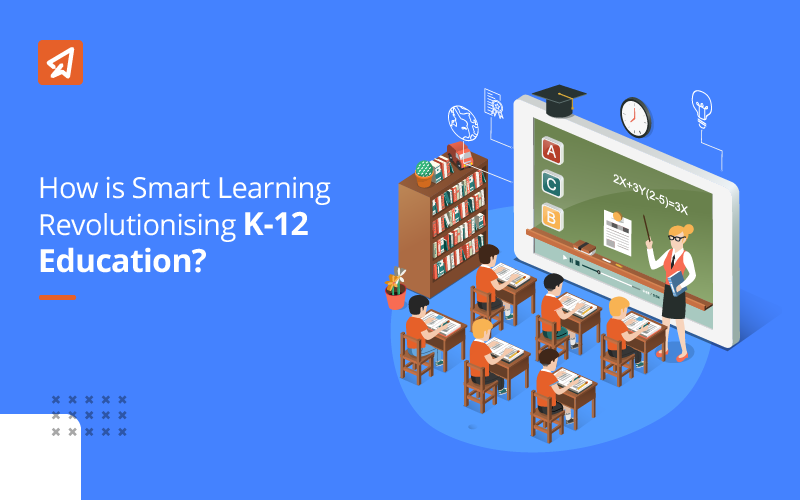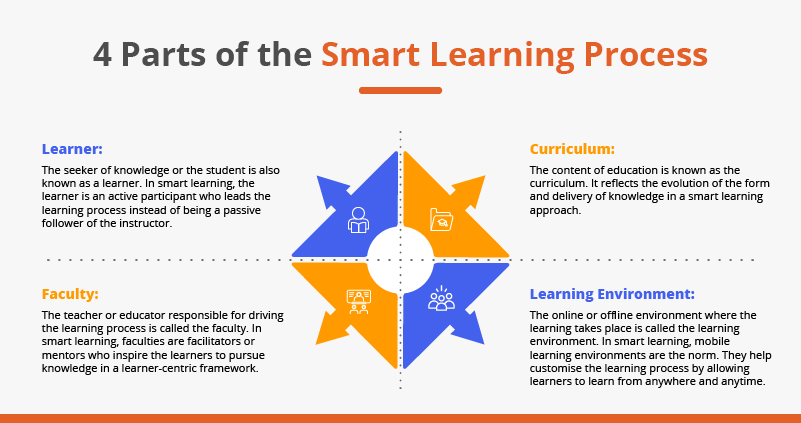How is Smart Learning Revolutionising K-12 Education?

In the 21st century, smart learning is used interchangeably with education. Smart learning makes education simpler, faster, and more effective – especially when learning complicated concepts such as trigonometry or calculus. It is a global trend that will change how people learn new skills and gain new knowledge worldwide.
Smart learning is a new trend widely adopted by schools across India. Do you use smart learning in your institution? If you wish to learn more about smart education solutions, EdTech in schools, and the smart learning approach – you are in the right place. This article will discuss all the nuances of smart learning, the different ways to use education technology to enhance the learning experience and the benefits.
What is Smart Learning?

Smart education and learning involve the intelligent use of technology to empower the learning process and make it engaging, personalised, and more effective. There are four parts of the smart learning process –
- Learner: The seeker of knowledge or the student is also known as a learner. In smart learning, the learner is an active participant who leads the learning process instead of being a passive follower of the instructor.
- Faculty: The teacher or educator responsible for driving the learning process is called the faculty. In smart learning, faculties are facilitators or mentors who inspire the learners to pursue knowledge in a learner-centric framework.
- Curriculum: The content of education is known as the curriculum. It reflects the evolution of the form and delivery of knowledge in a smart learning approach.
- Learning Environment: The online or offline environment where the learning takes place is called the learning environment. In smart learning, mobile learning environments are the norm. They help customise the learning process by allowing learners to learn from anywhere and anytime.
Upgrade your Classroom Experience with the Extramarks Smart Class Plus!
Talk to Our ExpertsTraditional vs. Smart Learning
Traditional Learning
Traditional learning has laid the foundation of education and has remained the modus operandi for educators for centuries. It comprises a structured classroom, a standardised curriculum, and a one-size-fits-all instructional approach. Even though traditional learning is the foundation of most education systems in the world, it is found lacking when it comes to diverse learning needs, individual learning styles, and engagement.
Smart Learning
By leveraging technology, smart learning aims to create a dynamic, engaging, and personalised learning experience. It represents a paradigm shift in education – as it works with a learner-centric approach. Unlike traditional learning, smart learning aims to adapt the instructional approach to suit individual learning styles using tailor-made content and immersive learning experiences.
Learn more on Smart Learning Vs Traditional Learning
Benefits of Smart Learning
Adopting smart education and learning for your institution holds several benefits for students and teachers.
For Students:
For Educators:
Schools and higher education institutions partner with Extramarks to create customised smart learning solutions that benefit students and educators. We analyse your teaching methodologies and students’ learning needs to create your institution’s most sustainable smart learning application. Explore our wide range of new-age learning solutions now!
Smart Learning Challenges and Solutions
Despite the excellent benefits of smart learning, it also brings challenges for the institutions that wish to adopt it. Here is a look at the most common challenges faced by schools that take the first step towards integrating smart learning solutions into their education ecosystem:
- Resistance to ChangeImplementing smart learning solutions may invite resistance from teachers, administrators, and students who are accustomed to traditional learning methods. School leaders may overcome this challenge by employing change management strategies and maintaining transparency at all levels.Solution Choose a smart learning system emphasising clear communication among management, administration, teachers, and students. The Extramarks Smart Class Product offers seamless user connectivity, simplified classroom management solutions, and enhanced student engagement through a unique classroom-to-home ecosystem. It helps teachers and students experience the benefits of classroom management first-hand to reduce resistance to change.
- Infrastructure and Connectivity ChallengeAccess to technology and the internet can be challenging for many schools. Accessing the technological infrastructure and connectivity needed for smart learning is difficult for educational institutions in remote areas. Such institutions need significant investment to implement equitable smart learning solutions for all their students.Solution School leaders can discuss the significance of smart learning solutions for their students with the district administration to garner financial support. Large corporations also invest in fields like education and agriculture to improve their social impact – they can help fund a school’s drive to implement smart learning. Extramarks Smart Class Plus offers all our partner schools reliable and substantial operational support for implementing and using effective smart learning solutions in their school.
- Teacher Training & Professional DevelopmentSmart learning requires a paradigm shift in a school’s teaching and learning methods. Teachers must lead the change and guide the students about using the smart learning tools to their benefit. Teachers need training to effectively utilise technology, curate high-quality online resources, and design engaging and interactive learning experiences. Schools should be ready to invest in professional development for teachers to ensure the effective implementation of smart learning techniques.Solution Schools must organise training programs to help familiarise teachers with smart learning technology while emphasising the pedagogical benefits of smart learning. Extramarks is revolutionising the teacher experience by empowering teachers through user-friendly technology, automated solutions for administrative tasks, and a student-centred approach to impactful instruction. EXTRAMARKS also has a dedicated training, maintenance and support team to resolve any issues promptly.
- Measuring Learning Outcomes & Assessing ImpactSmart learning aims for holistic education and development of the learner. The learning outcomes from smart learning pedagogy may not be accurately measured by standardised testing. Teachers must employ diverse evaluations, including formative assessments, project-based learning, and developing student portfolios to capture the entire range of learning outcomes. Evolving assessment techniques are vital to finding the relevant data to drive pedagogical decisions – which can improve smart learning strategies for the school.Solution Extramarks creates comprehensive solutions that enable schools to implement end-to-end smart learning modules in the school. The Extramarks Smart Class Plus application includes game-based learning that helps teachers gather insights about each student’s level of understanding and pace of learning. This data is then used to improve the smart learning approach and personalise the learning experience for students. It also includes holistic, hassle-free assessments wherein test-creation and in-class practice are simplified for teachers, with the flexibility to conduct pen-and-paper tests, instant grading of evaluations, and shareable answer keys. All these features make it possible to evolve assessments with evolving learning styles. With new-age assessments, Extramarks Smart Class Plus offers actionable analytics on a convenient teacher dashboard.Such data can offer valuable insights to teachers about the effectiveness of smart learning methods, classroom management concerns, and precise recommendations on areas of improvement.
- Adapting Curriculum and AssessmentsTo implement personalised learning experiences under the smart learning methodology, schools must revise their curriculums and assessment techniques to suit the new learning model. Educators must adapt assessment strategies to gauge student progress in a dynamic learning environment. The effectiveness of smart learning strategies may also be visible to teachers and students only when the learning outcomes are measured with accuracy.Solution The Extramarks Smart Class Plus application designs all smart learning solutions following the curricula defined in the new education policy. We bring you the latest in technology and subject matter to upgrade the learning experience offered in your school. Teachers can administer tests by automating the creation of tests and in-class practice exercises on the Smart Class App.
- Measuring & Evaluating EffectivenessSchool leaders need to define a robust evaluation framework for smart learning outcomes before implementing a smart learning policy in their institution. As the concept of smart learning is new, school leaders may find it challenging to define the key performance indicators to monitor and measure the work done by their teachers and the knowledge gained by their students through smart learning.Solution Identifying the indicators for success in the smart learning environment can help chalk out a roadmap of effectiveness for schools. For example, measuring aspects like student engagement, higher achievement levels, and reduced dropout rates can help give an insight into the success of smart learning strategies in your school.
Adopting a new learning strategy for an educational institution is easier said than done. However, partnering with the right experts can be the difference between effective implementation and a failed attempt. Our experts at Extramarks work alongside school management to understand the pedagogical structure of your school and offer customised solutions that can help your institution shift from a traditional instructor-centric education model to smart learning within weeks.
Sign up today to enjoy interactive learning methods, holistic assessments, and actionable data insights with Extramarks Smart Class Plus.
Talk to Our Expert!Last Updated on February 10, 2025
Reviewed by

Priya Kapoor | AVP - Academics
Priya Kapoor is an accomplished education professional with over 18 years of experience across diverse fields, including eLearning, digital and print publishing, instructional design, and content strategy. As the AVP – Academics at Extramarks, she leads academic teams in creating tailored educational solutions, ensuring alignment with varied curricula across national and international platforms...read more.


























